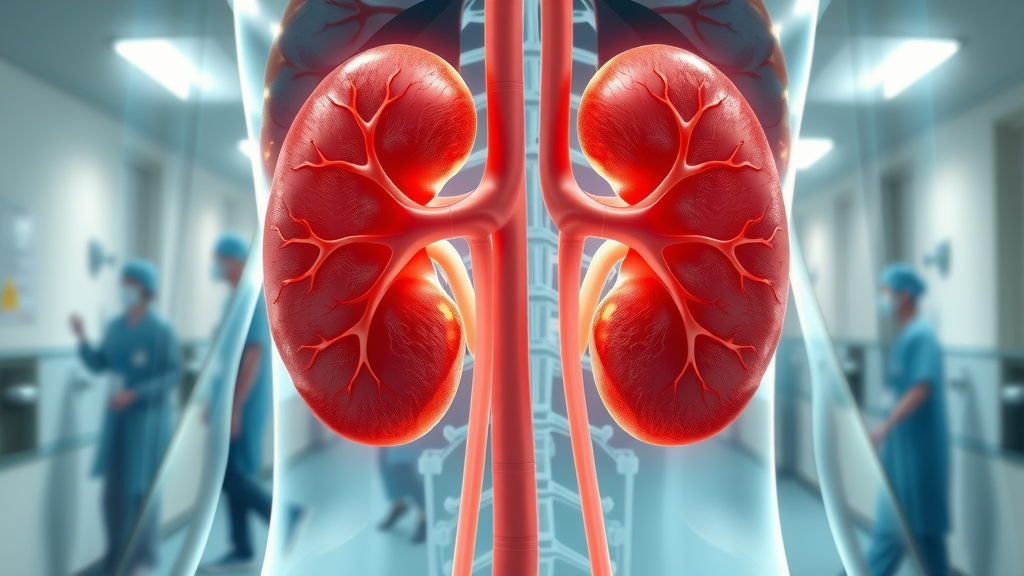Did you know that nearly half of adults in the United States have high blood pressure, but only one in four has it under control? Discover how natural supplements for blood pressure can change the story for millions. Why Natural Supplements for Blood Pressure Matter: Facts, Benefits, and Key Considerations Understanding High Blood Pressure and Its Impact Defining high blood pressure and its risks Prevalence in the United States The role of blood vessels and blood flow High blood pressure, or hypertension, is one of the most pervasive risk factors for heart disease and stroke in the United States. This condition, defined by consistently elevated pressure in your arteries, can strain your blood vessels and lead to lasting damage over time. Unmanaged, high blood pressure is a leading contributor to cardiovascular disease —including coronary heart disease and vascular disease—making early intervention crucial. With almost half of adults affected, especially as we age, addressing high blood pressure isn't just a recommendation—it's a necessity for maintaining health and independence. Your blood flow relies on open and flexible blood vessels to deliver oxygen-rich blood throughout your body. Over time, high blood pressure stiffens and narrows these vessels, reducing their ability to function efficiently. This is why experts increasingly recommend a combination of lifestyle changes—diet, movement, and proven natural supplements —to support your blood vessel health for the long term. Understanding and managing your blood pressure today could change your heart health for decades to come. The Science Behind Natural Supplements for Blood Pressure How natural supplements interact with blood vessels Differences between supplements and prescription medications Importance of consulting with a healthcare professional Natural supplements blood pressure products often work by gently supporting your body's natural pathways, such as widening blood vessels or helping regulate key minerals like potassium and magnesium. Unlike prescription drugs that deliver potent, sometimes immediate changes—and a higher risk for side effects—supplements aim to optimize blood pressure more gradually and with fewer complications. It's essential, however, to treat supplements with respect: while safer for many, they can still interact with your current medications, and their effects can vary by individual. Consulting a healthcare professional before starting any new supplement is crucial. Your doctor can highlight potential side effects , review possible drug-supplement interactions , and tailor recommendations to your unique health profile. Remember, natural approaches are best used as complements—not substitutes—for prescribed care, particularly if you're already diagnosed with high blood pressure or heart disease. Comparison of Top Natural Supplements for Blood Pressure Control Supplement Main Benefit Mechanism of Action Key Research Magnesium Relaxes blood vessels Vascular muscle relaxation Multiple clinical trials Potassium Balances sodium, lowers blood pressure Increases salt excretion Cohort and intervention studies Omega-3 Fatty Acids Supports heart, reduces systolic and diastolic blood pressure Reduces vascular inflammation Meta-analyses Garlic Improves vessel health, lowers high blood pressure Boosts nitric oxide Randomized controlled trials Ranking the Best Natural Supplements for Blood Pressure: A Comprehensive List 1. Magnesium: Relax Blood Vessels and Lower Your Blood Pressure Role in blood vessel relaxation Dosage recommendations Potential side effects and precautions Magnesium is a fundamental mineral that aids in relaxing the muscles of your blood vessels . This relaxation effect helps improve blood flow and subsequently lower blood pressure. Studies show that adequate magnesium intake is associated with reduced systolic and diastolic blood pressure, especially for those with high blood pressure or those at higher risk for heart disease. You’ll often find magnesium in many foods—like leafy greens, beans, and nuts—but supplementation is sometimes required to meet optimal levels. The typical recommended dosage for magnesium supplements is 200–400 mg per day, though individual needs can vary. It's wise to start at a lower dose to assess tolerance and work with your healthcare professional for guidance. While most people tolerate magnesium well, taking too much can cause gastrointestinal disturbance—common side effects include diarrhea and upset stomach. Always consult with your doctor, especially if you have kidney disease. 2. Potassium: Balancing Sodium and Lowering Blood Pressure How potassium lowers blood pressure Best dietary sources Interactions to consider Potassium is vital in helping lower blood pressure by encouraging your kidneys to excrete excess sodium—one of the main contributors to high blood pressure. When your body has enough potassium, it counters high sodium intake and supports flexible, healthy blood vessels , reducing the strain on your arteries. Clinical research robustly backs potassium's role in reducing high blood pressure across diverse populations. Bananas, oranges, spinach, avocados, and potatoes are all loaded with potassium. For most adults, the recommended per-day potassium intake is 2,600 mg (women) and 3,400 mg (men), but supplements can help bridge the gap if dietary sources fall short. However, too much potassium—especially if you have kidney problems or take certain medications—can be dangerous. Always discuss potassium supplements with your healthcare professional and monitor potassium levels if you’re on medication. 3. Omega-3 Fatty Acids: Protecting People With Heart Concerns Evidence for reducing high blood pressure Fish oil and plant-based sources Advice for people with heart conditions Omega-3 fatty acids , commonly found in fish oil, are among the most researched nutrients for heart health and blood pressure support. They work by reducing inflammation inside the vascular system and boosting nitric oxide production, which relaxes blood vessel walls and improves blood flow. Studies note modest reductions in both systolic and diastolic blood pressure, particularly for people with heart disease or significant risk factors . The best-known sources of omega-3s include fatty fish (salmon, mackerel, sardines) and plant-based options like flaxseed and walnuts. The typical dosage for supplements ranges from 1,000 to 2,000 mg per day of combined EPA and DHA (the two most important omega-3s). These are generally safe but high doses can interfere with blood clotting or interact with anti-hypertensive medications, so coordination with your healthcare professional is key. 4. Coenzyme Q10 (CoQ10): Boost Heart Health and Blood Flow Mechanism for lowering your blood pressure Clinical studies and effectiveness Side effect profile Coenzyme Q10 (CoQ10) is a naturally occurring antioxidant that powers energy production in every cell, particularly those in the heart. Research indicates that CoQ10 may lower systolic and diastolic blood pressure by improving the energy efficiency of heart muscle and supporting dilation in blood vessel walls. Some clinical studies report drops of up to 10 mm Hg in systolic blood pressure after several weeks of supplementation. Standard doses range from 100 to 200 mg per day, typically split into two doses for best absorption. Most people experience few or no side effects, though some report mild digestive upset. Because CoQ10 can interact with blood thinners and other heart medications, always seek the advice of a healthcare professional before beginning supplementation. 5. Garlic: Nature’s Proven Remedy for High Blood Pressure Active compounds that support blood vessel health Ideal forms and doses Scientific evidence Garlic contains powerful compounds like allicin, which have been shown to improve blood vessel health and effectively lower blood pressure. It operates by stimulating nitric oxide production and dilating blood vessels, which helps in reducing blood pressure . Repeated clinical studies, including randomized controlled trials, show garlic can significantly reduce both systolic and diastolic blood pressure for those with high blood pressure. Garlic’s best effects come from fresh extracts, aged garlic supplements, or standardized capsules, usually dosed at 600–1,200 mg daily. Side effects may include mild digestive discomfort or, occasionally, allergic reaction. Garlic can affect blood clotting, especially if combined with prescription blood thinners, so check with your healthcare team before adding garlic supplements. 6. Beetroot: Enhance Nitric Oxide and Lower Blood Pressure Beetroot’s effect on high blood pressure Natural drinks vs. supplements Safety and recommendations Beetroot is uniquely rich in dietary nitrates, compounds converted in your body into nitric oxide—a key molecule that relaxes your blood vessels and enhances blood flow. Several trials have shown beetroot juice can lower systolic blood pressure within hours of consumption, making it one of the most effective natural drinks for rapid improvement. Regular intake can help maintain healthy pressure levels over time, especially when paired with other healthy habits. Fresh beetroot juice and whole beets provide the strongest effects, but powdered supplements are also available. Most people tolerate beets well, but some may notice harmless changes in urine color or mild digestive changes. Those prone to kidney stones should moderate beet intake, as beets are high in oxalates. Always adjust your approach to meet your unique dietary and health needs. 7. Hawthorn: Herbal Support for Blood Vessels Traditional uses and modern findings Best preparations for high blood Cautions and side effects Hawthorn has long been used in traditional herbal medicine for its ability to strengthen blood vessels and support cardiovascular health. Recent research supports its use in gently lowering mild to moderate high blood pressure, possibly by dilating arteries and influencing nervous system signals that control blood pressure. Commonly taken as teas, capsules, or tinctures, hawthorn may help those seeking plant-based cardiovascular support. The ideal dose varies by preparation but often falls between 250–500 mg of standardized extract, taken two to three times daily. Side effects are uncommon but may include nausea, headache, or dizziness, especially at higher doses. Hawthorn can interact with digitalis and antihypertensive medications, so supervision by a healthcare professional is advised before use. 8. L-Arginine: Amino Acid for Blood Vessel Health Mode of action in supporting blood flow Suitable dosages for lower blood pressure Consult with your healthcare professional L-Arginine is an amino acid that serves as a direct precursor for nitric oxide, a compound essential for relaxed, flexible blood vessels and healthy blood flow . Supplementing with L-Arginine may help lower blood pressure by making it easier for blood to move through arteries, especially in those with mild hypertension or risk factors for heart problems. Typical dosages range from 2 to 6 grams per day, usually split into two doses, but always follow your healthcare professional’s advice and monitor for interactions with blood pressure drugs. Some people may experience minor side effects such as digestive upset or headache. Remember, long-term effectiveness and safety are still being studied, so use caution and periodic blood pressure checks. 9. Vitamin D: Connection Between Deficiency and High Blood Pressure Research on vitamin D and blood pressure Sources and supplementation tips Side effects from excess Growing evidence links vitamin D deficiency to an increased risk of high blood pressure, possibly due to its regulatory effects on arterial stiffness, inflammation, and hormone balance. Supplementing vitamin D in those who are deficient has been shown to help lower blood pressure moderately, especially in older adults or those with little sun exposure. The body produces vitamin D naturally through sun exposure, but it can also be supplemented in doses of 600–2,000 IU per day depending on your blood levels and doctor’s recommendation. Over-supplementing can lead to toxicity, presenting as weakness, confusion, or kidney problems, so don’t exceed your recommended dose and check in with your healthcare professional. 10. Other Noteworthy Natural Supplements for Blood Pressure Resveratrol, probiotics, and more Unique benefits and scientific overview In addition to the main supplements above, several others show promise in supporting healthy blood pressure. Resveratrol , an antioxidant from grapes, may help improve endothelial function. Probiotics can influence blood pressure via gut health, while other botanicals (like hibiscus and celery seed) may offer gentle blood pressure support through various pathways. While data for these is less robust, integrating them with the guidance of your healthcare provider can round out your natural blood pressure strategy. These supplements may be especially helpful for those who want to embrace a multi-pronged approach to vascular health, but further research is needed to confirm their optimal dosing and long-term safety. Key Lifestyle Changes that Enhance Natural Supplement Benefits for Blood Pressure Integrating Exercise and Diet to Support Blood Vessel Health Most effective lifestyle changes Diet tips for lower blood pressure How supplements synergize with daily habits While natural supplements blood pressure can be powerful, their effectiveness multiplies when combined with smart lifestyle changes . Regular physical activity—like brisk walking, swimming, or gentle aerobics—not only supports healthy blood vessels but amplifies the benefits of supplements by improving your body’s response. A balanced diet—rich in fruits, vegetables, whole grains, lean proteins, and low in sodium—works hand-in-hand with supplementation. The DASH (Dietary Approaches to Stop Hypertension) diet has received high marks for its ability to reduce blood pressure naturally. Supplements can fill in nutritional gaps, but the foundation should always be a consistently healthy lifestyle. Working with a Healthcare Professional for Blood Pressure Management Individualizing your natural supplement regimen The importance of regular monitoring Blood pressure—and your best approach to managing it—can vary greatly from one person to another. A trusted healthcare professional is your best ally for building an individualized supplement plan that considers your history, medications, and personal goals. Regularly monitoring your blood pressure at home and during medical checkups helps you and your provider make meaningful adjustments over time. This collaboration maximizes the odds of lasting success while minimizing the risk of unwanted side effects . Recognizing and Managing Side Effects of Natural Supplements for Blood Pressure Possible Side Effects to Watch for When Lowering Your Blood Pressure Allergic reactions Drug-supplement interactions Signs to stop supplement use While most natural supplements blood pressure are well-tolerated, it’s important to remain vigilant for potential side effects . These may include headaches, gastrointestinal upset, allergic reactions (such as hives or swelling), and, rarely, more serious complications like irregular heart rhythms. Certain supplements may also interact with your prescription drugs—especially blood thinners, blood pressure medications, or diuretics—potentially amplifying or reducing their effects. If you notice symptoms such as persistent coughing, slow or irregular heartbeat, dizziness, swollen extremities, or difficulty breathing, stop supplementation immediately and consult your healthcare provider. Always start supplements one at a time and keep records, so you can quickly identify the culprit in the event of an adverse reaction. “Using natural supplements can be an effective part of a broader heart health strategy, but consulting with a qualified healthcare professional is vital to ensure safety and optimal outcomes.” – Senior Health Expert People Also Ask What is the best natural supplement for blood pressure? While results vary by individual, magnesium, omega-3 fatty acids, and garlic are among the most researched and widely recommended natural supplements for lowering high blood pressure. A healthcare professional can help you choose what’s best for your needs. What is the best natural drink for high blood pressure? Beetroot juice is one of the most effective natural drinks, rich in nitrates that help lower blood pressure by relaxing blood vessels. Others include hibiscus tea and pomegranate juice, which also support cardiovascular health. Frequently Asked Questions About Natural Supplements for Blood Pressure Can natural supplements replace my prescription medication for high blood pressure? No; natural supplements are best used as complements, not substitutes, to prescribed medications unless advised otherwise by your healthcare provider. Stopping medication without supervision can be dangerous. Are there any risks associated with using multiple supplements together? Yes. Using several supplements can increase the risk of side effects and drug interactions. Always consult your doctor before combining supplements, especially if you take prescription medications. How quickly can natural supplements lower blood pressure? Some, like beetroot juice, may work within hours, while others (magnesium, CoQ10) often take several weeks to show measurable effects. Consistency and monitoring are crucial for safety and results. What signs indicate I should stop taking a supplement? If you experience symptoms such as shortness of breath, chest pain, swelling, severe dizziness, or allergic symptoms (hives, swelling, difficulty breathing), stop immediately and seek medical attention. Quick Facts: Natural Supplements Blood Pressure Nearly half of US adults experience high blood pressure Natural supplements can complement—NOT replace—medical treatment Regular monitoring and lifestyle changes are vital for success Summary Table of Natural Supplements Blood Pressure: Efficacy, Dosage, and Side Effects Supplement Efficacy Typical Dosage Notable Side Effects Magnesium Proven 200–400 mg/day Diarrhea, GI upset Potassium Strong 2,600–3,400 mg/day Hyperkalemia (rare) Omega-3 Strong 1,000–2,000 mg/day Blood thinning, GI upset Garlic Strong 600–1,200 mg/day Digestive upset, bleeding CoQ10 Good 100–200 mg/day Rare (mild GI upset) Expert Tips: Safely Choosing and Using Natural Supplements for Blood Pressure Consult your healthcare professional before starting new supplements Look for reputable supplement brands Track your blood pressure progress regularly “Supplements can contribute to better blood pressure control, but lasting results require a holistic approach including diet, exercise, and regular medical care.” Take the First Step Toward Better Blood Pressure Control For more great information on senior health and wellness, visit https://ElderEarth.us today! To further enhance your understanding of natural supplements for blood pressure control, consider exploring the following authoritative resources: “10 Best Supplements for High Blood Pressure” : This comprehensive article from Verywell Health delves into various supplements, including L-Arginine, Magnesium, Potassium, and Vitamin D, discussing their mechanisms and potential benefits for blood pressure management. ( verywellhealth.com ) “5 Supplements To Lower Blood Pressure In 2025” : Published by Forbes Health, this piece provides insights into supplements like Magnesium, Coenzyme Q10, Garlic, and Potassium, highlighting their roles in supporting cardiovascular health and blood pressure regulation. ( forbes.com ) These resources offer in-depth information on how specific supplements can aid in blood pressure control, complementing the strategies discussed in your article.

 Add Element
Add Element  Add Row
Add Row 



Write A Comment